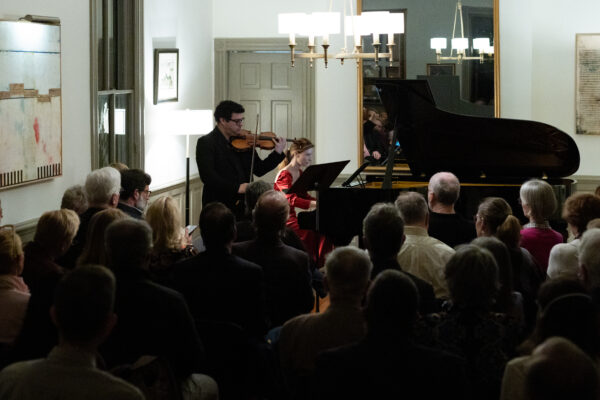Classical Concert Review: The Belvedere Series Plays Sibelius, Grieg, Nazaykinskaya, Vasks, and Shostakovich
By Jonathan Blumhofer
The Belvedere Series is a chamber music group whose mission of bringing the art form to new audiences is matched by an admirable desire to expand and redefine just what the canon is. Even better: that ambition is backed up by top-flight programming, playing, and musicianship.

The Belvedere Series in action. Pianist Ingrid Keller and violinist Dominic Salerni. Photo: David Pearson
Richmond, Virginia, might not be the first place to come to mind as a Mecca for chamber music. Yet with The Belvedere Series, the Commonwealth’s capital boasts a group whose mission of bringing the art form to new audiences is matched by an admirable desire to expand and redefine just what the canon is. Even better: that ambition is backed up by top-flight programming, playing, and musicianship.
Founded by pianist and Massachusetts native Ingrid Keller, the Series is now in its third season. Having recently embarked on an ambitious, years-long commissioning project, it’s also ever-growing.
As if to underline the point, last weekend, the group — whose core membership hails from Virginia and the wider mid-Atlantic region — presented Midnight Twilight, a survey of works by Nordic and Russian composers past and present. Given at Richmond’s historic Marburg House, the concert was part of the Belvedere’s intimate salon series.
By about any measure, the coziness of the venue — a narrow, resonant, high-ceilinged parlor — makes for an immersive, sometimes intense, concertgoing experience. It certainly presents a range of logistical and programming challenges that don’t emerge with bigger spaces. Even so, the musical rewards of the setup are considerable and, on the merits of Sunday’s fête, perhaps more groups and presenting organizations should seriously consider the model.
More than anything, the afternoon’s charged program carried with it a cathartic aspect. For all the tumult and occasional whimsy of its five selections, the program’s immense expressive palette came over with uncompromising, nuanced force. In the process, it lent our own unsettled times some welcome context.
The event was anchored by Dmitri Shostakovich’s Piano Trio No. 2. Written in the aftermath of Stalin’s purges and as the Great Patriotic War raged, this is music of considerable turmoil tied to the moment of its creation.
Shostakovich’s artistry, however, exceeds a specific epoch. In its weeping and storminess, the Trio’s extremes are well-nigh universal. So, too, its cheeky defiance, perhaps best demonstrated by the finale’s snapping, klezmer-ish passages.
Sunday’s account of the score from Keller, violinist Domenic Salerni, and cellist Andres Sanchez leaned into those latter moments with aplomb. In fact, the apotheosis of that movement seemed, for all its swing and sweep, to take on a life entirely its own.
Throughout, the collective brought an incisively conversational quality to the Trio’s counterpoint. The well-shaped first movement’s climaxes were biting and rhythmically locked-in. So were the Allegro’s raw, insistent attacks.
At the start of the great Largo, Keller drew thundering sonorities from her keyboard. That stentorian introduction, though, resolved into playing of shattering vulnerability and soul from the larger group across the movement’s main body.
Read the full review here.


